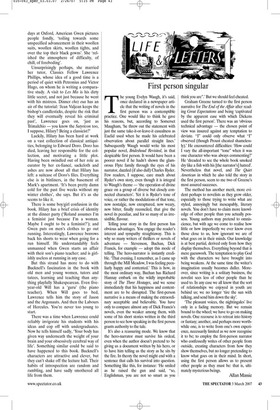First person singular
The young Evelyn Waugh, it’s said, once declared in a newspaper article that the writing of novels in the first person was a contemptible practice. One would like to think he gave his reasons, but, according to Somerset Maugham, ‘he threw out the statement with just the same take-it-or-leave-it casualness as Euclid used when he made his celebrated observation about parallel straight lines.’ Subsequently Waugh would write his most popular novel, Brideshead Revisited, in that despicable first person. It would have been a poorer novel if he hadn’t shown the glamorous Flyte family through the eyes of his narrator, dazzled (if also dull) Charles Ryder. Few readers, I suppose, care much about Ryder’s own story, even though it is integral to Waugh’s theme — ‘the operation of divine grace on a group of diverse but closely connected characters’. Yet it is Ryder’s tone of voice, or rather the modulations of that tone, now nostalgic, now enraptured, now weary, now bitter, finally reconciled, that give the novel its peculiar, and for so many of us irresistible, flavour.
Telling your story in the first person has obvious advantages. You engage the reader’s interest and sympathy straightaway. This is why so many writers of thrillers or novels of adventure — Stevenson, Buchan, Dick Francis, for example — adopt this mode of telling. The hero-narrator is instantly credible. ‘That evening, I remember, as I came up through the Mill Meadow, I was feeling peculiarly happy and contented.’ This is how, in the most ordinary way, Buchan has Richard Hannay embark on the wildly improbable story of The Three Hostages, and we sense immediately that his happiness and contentment are to be disrupted. The first-person narrative is a means of making the extraordinary acceptable and believable. You have only to compare almost any of Dick Francis’s novels, even the weaker among them, with some of his short stories written in the third person to see how speaking in the first person grants authority to the tale.
It’s also a reassuring mode. We know that the hero-narrator must survive his ordeal, even when the author doesn’t pretend to be giving us a document written by his hero, or to have him telling us the story as he sits by the fire. In theory the novel might end with a sentence that calls his survival into question. Something like this, for instance: ‘He smiled as he raised the gun and said, “so, Englishman, you are not so smart as you think you are”.’ But we should feel cheated.
Graham Greene turned to the first person narrative for The End of the Affair after reading Great Expectations and being ‘captivated by the apparent ease with which Dickens used the first person’. There was an ‘obvious technical advantage — the chosen point of view was insured against any temptation to deviate. “I” could only observe what “I” observed (though Proust cheated shamelessly).’ He encountered difficulties: ‘How could I vary the all-important “tone” when it was one character who was always commenting?’ He ‘dreaded to see the whole book smoked dry like a fish with his [the narrator’s] hatred’. Nevertheless that novel, and The Quiet American in which he also told the story in the first person, seem to me two of Greene’s most assured successes.
The method has another merit, more evident perhaps to novelists as they grow older, especially to those trying to write what are styled, annoyingly but inescapably, literary novels. You don’t have to claim more knowledge of other people than you actually possess. Young authors may pretend to omniscience, but with age we come to realise how little or how imperfectly we ever know even those close to us, how ignorant we are of what goes on in their minds. Our knowledge is at best partial, derived only from how they display themselves. Everything beyond that is mere guesswork. The temptation to play God with the characters we have brought into being weakens. At the same time the writer’s imagination usually becomes duller. Moreover, since writing is a solitary business, the novelist sees less of other people than he used to. In any case we all know that the sort of relationships we enjoyed in youth are behind us; we no longer ‘tire the sun with talking, and send him down the sky’.
‘The pleasant voices, the nightingales’ live only in a fading memory. But we remain bound to the wheel; we have to go on making novels. One recourse is to retreat into history or fantasy; another, and perhaps more worthwhile one, is to write from one’s own experience, necessarily limited as we now recognise it to be; to employ the first-person narrator who confessedly writes of other people from outside, creating characters from how they show themselves, but no longer pretending to know what goes on in their mind. In short, using the first person allows us to present other people as they must be: that is, ultimately mysterious beings.
Allan Massie










































































 Previous page
Previous page